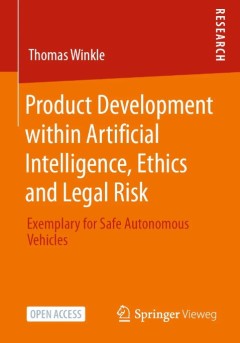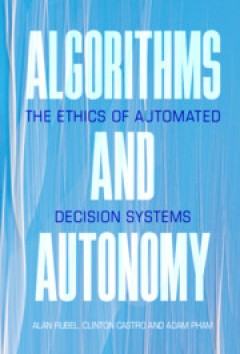Filter by

The governance of insurance undertakings : corporate law and insurance regula…
This open access volume of the AIDA Europe Research Series on Insurance Law and Regulation brings together contributions from authors with different legal cultures. It aims to identify the legal issues that arise from the intersection of two disciplines: insurance law and corporate/company law. These legal issues are examined mainly from the perspective of European Union (EU) law. However, ther…
- Edition
- 7
- ISBN/ISSN
- 9783030858179
- Collation
- x; 360p; ill.
- Series Title
- -
- Call Number
- 346.4086 GOV P

Carceral Logics : Human Incarceration and Animal Captivity
Carceral logics permeate our thinking about humans and nonhumans. We imagine that greater punishment will reduce crime and make society safer. We hope that more convictions and policing for animal crimes will keep animals safe and elevate their social status. The dominant approach to human-animal relations is governed by an unjust imbalance of power that subordinates or ignores the interest non…
- Edition
- -
- ISBN/ISSN
- 9781108919210
- Collation
- xiii, 450 p ; ill
- Series Title
- -
- Call Number
- 344.049 CAR L

Migrants' Rights, Populism and Legal Resilience in Europe
Bringing together scholars of migration and constitutional law, this volume analyses the problematic relationship between the rise of populism, restrictions of migrants' rights and democratic decay in Europe. By offering both constructive and critical accounts, it creates a nuanced debate on the possibilities for and limitations of legal resilience against populist erosion of migrants' rights. …
- Edition
- -
- ISBN/ISSN
- 9781009040396
- Collation
- xiii, 410 p
- Series Title
- -
- Call Number
- 342.4082 MIG V

Product Development within Artificial Intelligence, Ethics and Legal Risk : E…
This open-access-book synthesizes a supportive developer checklist considering sustainable Team and agile Project Management in the challenge of Artificial Intelligence and limits of image recognition. The study bases on technical, ethical, and legal requirements with examples concerning autonomous vehicles. As the first of its kind, it analyzes all reported car accidents state wide (1.28 milli…
- Edition
- -
- ISBN/ISSN
- 9783658342937
- Collation
- xlii, 248 p.
- Series Title
- -
- Call Number
- 629.2 PRO T

Patent Remedies and Complex Products : Toward a Global Consensus
Through a collaboration among twenty legal scholars from eleven countries in North America, Europe and Asia, Patent Remedies and Complex Products presents an international consensus on the use of patent remedies for complex products such as smartphones, computer networks and the Internet of Things. It covers the application of both monetary remedies like reasonable royalties, lost profits, and …
- Edition
- -
- ISBN/ISSN
- 9781108594981
- Collation
- xxvi, 380 p : ill
- Series Title
- -
- Call Number
- 346.0486 PAT C

Algorithms and Autonomy : The Ethics of Automated Decision Systems
Algorithms influence every facet of modern life: criminal justice, education, housing, entertainment, elections, social media, news feeds, work… the list goes on. Delegating important decisions to machines, however, gives rise to deep moral concerns about responsibility, transparency, freedom, fairness, and democracy. Algorithms and Autonomy connects these concerns to the core human value of …
- Edition
- -
- ISBN/ISSN
- 9781108895057
- Collation
- viii, 218 p ; ill
- Series Title
- -
- Call Number
- 174.90063 ALG A

The Cambridge Handbook of Health Research Regulation
The first ever interdisciplinary handbook in the field, this vital resource offers wide-ranging analysis of health research regulation. The chapters confront gaps between documented law and research in practice, and draw on legal, ethical and social theories about what counts as robust research regulation to make recommendations for future directions. The Handbook provides an account and analys…
- Edition
- -
- ISBN/ISSN
- 9781108620024
- Collation
- xix, 444 p ; ill
- Series Title
- -
- Call Number
- 344.04196 CAM G

Politics, Policy, and Public Options
A public option is a government-provided social good that exists alongside a similar privately provided good. While the public option is typically identified with health care policy, public options have been a longstanding feature of American life in a variety of sectors, ranging from libraries to swimming pools. Public schools, for example, coexist alongside private schools. However, there is …
- Edition
- -
- ISBN/ISSN
- 9781108767552
- Collation
- ix, 186 p ; ill
- Series Title
- -
- Call Number
- 344.730316 POL G

Resilience, Adaptive Peacebuilding and Transitional Justice How Societies Re…
Processes of post-war reconstruction, peacebuilding and reconciliation are partly about fostering stability and adaptive capacity across different social systems. Nevertheless, these processes have seldom been expressly discussed within a resilience framework. Similarly, although the goals of transitional justice – among them (re)establishing the rule of law, delivering justice and aiding rec…
- Edition
- -
- ISBN/ISSN
- 9781108919500
- Collation
- xvii, 310 p ; ill
- Series Title
- -
- Call Number
- 155.232 RES J

Environmental groups and legal expertise : shaping the Brexit process
Environmental Groups and Legal Expertise explores the use and understanding of law and legal expertise by environmental groups. Rather than the usual focus on the court room, it scrutinises environmental NGO advocacy during the extraordinarily dramatic Brexit process, from the referendum on leaving the EU in June 2016 to the debate around the new Environment Bill in the first half of 2020. T…
- Edition
- -
- ISBN/ISSN
- 9781787358584
- Collation
- xxi, 191 p.
- Series Title
- -
- Call Number
- 344.4046 ENV C
 Computer Science, Information & General Works
Computer Science, Information & General Works  Philosophy & Psychology
Philosophy & Psychology  Religion
Religion  Social Sciences
Social Sciences  Language
Language  Pure Science
Pure Science  Applied Sciences
Applied Sciences  Art & Recreation
Art & Recreation  Literature
Literature  History & Geography
History & Geography